- Home
- Jim Thompson
The Getaway Page 4
The Getaway Read online
Page 4
Doc nodded. He didn’t trust himself to speak.
“I’m keeping your gun,” Rudy went on. “I’m taking any iron that Carol has when she shows. We stop at night, you two get tied up. We stop for grub or something during the day, one of you stays with me. Either one of you tries anything, that’ll be it. Know what I mean? Okay?”
“I know exactly what you mean,” Doc purred, “and naturally it’s okay.”
They crossed a bridge over a small creek. Immediately on the other side, Rudy turned the car straight down the road’s embankment, then down the bank of the creek. The wheels bounced high in the air; the steering wheel jerked and spun in his hands. Rudy fought it around to his left, heading the car up the rocky bed of the stream with its shallow trickles of water. A couple of hundred yards farther on, beneath a cloaking arbor of trees, he brought it to a stop.
Doc took a handkerchief from his pocket, mopped at his forehead. He said mildly that he was afraid his neck was broken.
Rudy laughed. Doc got out of the car and removed his hat, continuing the mopping process as Rudy climbed out.
“You kill me, y’know, Doc?” Rudy was still snorting over the joke. “You really slay me sometimes. I…”
“So what’s wrong with that?” Doc said. And as Rudy burst into renewed laughter, he took a gun from his hat and fired.
“Got him right through the heart,” Doc told Carol. “One of those very rare instances where a man actually died laughing.”
“Just so he died.” Carol grimaced. “That’s one character I could never feel easy around. I always had a feeling that he was just about ready to jump at me from the one side I wasn’t watching.”
“Alas, poor Rudy,” Doc murmured. “But how have you been, my dear—to move from the ridiculous to the sublime?”
“We-el—” Carol slanted a sultry glance at him. “I think I’ll be a lot better tomorrow. You know. After I get a good night’s sleep.”
“Tut, tut,” said Doc. “I see you’re still a very wicked young woman.”
They had driven through Beacon City, commenting wonderingly on the smoke, looking curiously at the milling throngs; and now they were far down the highway on the other side of town. Doc was driving, since Carol had driven all night. She sat sidewise in the seat, facing him, her legs curled under her.
Their eyes kept meeting. They kept smiling at each other. Doc patted one of her small round flanks, and she held his hand for a moment, gripping it almost fiercely.
“What are you worried about, Doc?”
“Worried?”
“I can always tell. Is it Golie’s? You think that if Rudy isn’t with us…”
Doc shook his head. “No trouble there. I wouldn’t say I was worried about anything. Just puzzled in a troubled sort of way about our friend Beynon.”
“Oh,” said Carol. “Oh, yeah.”
Beynon was an attorney, the chairman of the pardon and parole board. Doc’s pardon had been bought from him, and there was still fifteen thousand dollars due on the purchase price. He owned a tiny ranch up in the far corner of the state. A bachelor, he lived on it when he was not occupied with some legal case or his official duties. They were going there now.
“Doc—” Carol was staring through the windshield. “Let’s make a switch. Head right into Mexico from here.”
“We couldn’t do it, baby. It’s too obvious. We’re too close.”
“But you haven’t been connected with the job. With any kind of break at all, it’ll be days before you are.”
“That doesn’t help much. Not when the job’s this big and this close to the border. They’ll have road blocks up fifty miles this side of El Paso. Everyone’ll get a shakedown. Anyone trying to cross over had better be strictly clean and able to prove it, or he’s in the soup.”
“Well—but the other way, Doc. Beynon is miles off of our route, and if you think he may be up to something, why—why…”
“Skip him?” Doc gave her a thoughtful look. “Is that what you were going to suggest, Carol?”
“Why not? What could he do about it?”
Doc smiled wryly, almost irritated with her. Leave Beynon holding the sack for his fifteen thousand? A man with his connections who knew as much about them as he did? It was too preposterous to discuss. They were due at his ranch just as quickly as they could get there from Beacon City, and they had damned well better not dally along the way.
“What could he do?” Carol repeated stubbornly. “Why pay him off, if he’s going to make trouble anyway?”
“I don’t know that he is. If he’s planning to, however, and if I can’t talk him out of it—” Doc left the sentence unfinished, his shrewd eyes thoughtful behind the obscuring sunglasses.
Beynon hadn’t run according to form. What he had done was completely out of character, and having acted in such a way, he must have a motive which did not appear on the surface.
Doc stroked his jaw, shook his head absently.
“How did he add up to you, Carol?” he asked. “I mean, aside from the fact that he’s an ambitious man with plenty of uses for money. Did he do or say anything that would indicate why he would go for a deal like this one?”
Carol didn’t answer him. Doc was about to repeat the question when he saw that she was asleep.
5
Doc went to New York the spring that he graduated from high school, a few weeks after his father’s death. He was too young to hold political office, and there were no worthwhile jobs in the town. On the other hand, he was convinced, as were his countless friends, that he would be virtually able to pick and choose from the many opportunities available in a large city.
Things didn’t work out that way. He had no difficulty in getting jobs, even in those times of economic depression. But he held none of them more than a few weeks. He was a disrupting influence, throwing any establishment he went into out of kilter. Other employees tended to gather around him, leaving their work undone. Minor supervisors coddled and favored him, to the detriment of morale. As an upper-echelon executive, he would have been invaluable to any company. But he qualified neither in years nor experience for anything but the lowliest jobs. And in that capacity he was simply a nuisance.
Working briefly and rarely, he lived largely on credit and small loans. He worried about these obligations (you did not let down your friends, his father had taught him), and he readily acquiesced when a bar owner-creditor offered to wipe the slate clean, and even gift him with a small bonus, in return for a “little favor.”
The favor was done; the barkeep collected on his burglary insurance. A few days later he introduced Doc to the proprietor of a floating crap game—a man who needed big money in a hurry and could not depend on gambling to get it. Doc was glad to cooperate with him. He stuck up the game, with some subtle assistance from the proprietor, and they split the proceeds.
Later on, the gambler having introduced him to some “right” boys, Doc stuck up one of his games again, without prearrangement and without splitting. Nor did this in any way violate his father’s code about friendship. On the contrary, the elder McCoy had believed that a man’s best friend is himself, that a non-friend was anyone who ceased to be useful, and that it was more or less a moral obligation to cash in any persons in this category, whenever it could be done safely and with no chance of a kickback.
Doc was made for crime, the truly big operations which he rapidly moved into. No one could get on the inside of a job as easily as he, no one could plan so shrewdly, no one was so imperturbable and coolheaded.
He liked his work. Beginning a stiff prison sentence at age twenty-five, he still remained loyally committed to it. His take for the last five years had been more than a hundred thousand a year. For that kind of money, a man could afford to sit it out for a while. He could use his enforced leisure to relax, make new contacts, improve his criminal knowledge and plan new jobs.
Doc’s ensuing eight years behind bars were entirely comfortable and often highly enjoyable. After all, a prison
cannot function without the cooperation of its inmates; it cannot do so satisfactorily at least, or for very long. So a man who can lead his fellow prisoners, who can deliver their cooperation or withhold it, can get almost anything he asks for. And about the only deprivation Doc suffered was the loss of his income.
Given the same circumstances, he could have taken his second and last prison sentence as lightly as he had the first. But the circumstances differed crucially. He was married—and to a woman almost fourteen years his junior. And he was thirty-six years old.
Doc didn’t fret about the situation. He never missed a meal, nor a night’s sleep, nor spent a moment in futile regret. He had just one problem—to get out before getting out became pointless. Very well then, if that was what had to be done, he would do it.
He had left sixty thousand dollars on the outside with Carol. With that, and a topflight criminal lawyer, he managed to get his twenty-year sentence reduced to ten. It was a long step on the road to freedom; barring upsets, he would qualify for parole in approximately seven years. But that wasn’t good enough for Doc. The seven years might as well be seventy as he saw it. And he wanted no more paroles. Trying to operate while on parole was what had put him where he was.
There were four members of the pardon and parole board, in addition to its chairman, Beynon. Exercising his unusual privileges, Doc approached them one by one. The middle-aged woman member fell for him; he was able to buy her with conversation. The three men members were open to a cash proposition.
Unfortunately Doc had run very, very low on money. He didn’t have nearly the amount needed for the three-man buy. And his lawyer, who was usually open to a “good” proposition himself, refused to play banker. “Not that I don’t trust you, Doc,” he explained. “I know I’d get mine right off the top of your first job. The point is there wouldn’t be any job, because there ain’t going to be any pardon. You’d’ve talked this over with me in the first place, I’d’ve told you you were wasting your time.”
“But I’d have four members. A majority of the board.”
“Majority, schmority! Three of ’em are crooks, and the gal’s a well-meaning imbecile. Beynon would veto them. If they tried to crowd him, he’d start swinging. Kick up such a stink that you’d probably have to do the rest of your time in the hole.”
“Turn it around then. If they can’t push him, can he push them?”
“He could. He could make ’em do a skirt dance on the capitol steps if he took a notion. But lay off, Doc. He didn’t get that way by going for the fast dollar.”
“Good for him. The better the reputation, the less the risk.”
“Yeah?” The lawyer smiled bitterly. “Like to meet a guy that almost got disbarred for offering Beynon a cigar? Well, shake hands.”
Doc wasn’t convinced. He’d dealt with Honest Johns before, and they’d never turned out as pure as they were supposed to be. So he arranged to see Beynon alone—and that was about all he did. Just saw him. And excused himself as quickly as he could. He was too shrewd—too able an interpreter of a man’s expression, the tone of his voice, his overall attitude—to do anything else. Beynon obviously wanted him to make the bribe attempt. It was also obvious that he had some very unpleasant plans for Doc as soon as it was made.
“So I’ll have to think of something else,” Doc told Carol on her next visit. “I don’t know what it will be, but Beynon’s definitely out.”
“Maybe not. We can’t be sure unless we try.”
“I’m sure. Beynon won’t take.”
“You mean he never has,” Carol persisted. “He won’t take from you or the lawyer. Ordinarily he wouldn’t take from me. But suppose I’d broken up with you, Doc—that it looked like I had. Then he’d have a double out for himself in case anyone got nasty. If I were through with you, then naturally I wouldn’t be giving him a bribe. And when a man’s wife quits him, it’s supposed to be punishment. Don’t you see, Doc? I wouldn’t have any reason to bribe him, and he would have a reason for giving you a break.”
It sounded pretty flimsy to Doc. But Carol wanted to try; and it was pressing four years since he had entered the penitentiary. So he told her to go ahead.
Two months passed before he saw her again. No one could have been more surprised than he when she reported success. Beynon would sell him a pardon. The price, five thousand cash, fifteen thousand within ninety days.
News of the robbery had been on the air since ten-thirty that morning. Carol and Doc listened to it, the radio tuned to a whisper, as they ate lunch at a roadside drive-in.
Rudy had been identified from rogues’ gallery photographs. Except for Jackson, whom he had killed, there was no mention of a confederate. Rudy had robbed the bank. Rudy had driven boldly out of town with “more than three hundred thousand dollars in swag.” The authorities were “puzzled” as to how he had gained entry into the bank to kill the guard. But no one raised the question as to whether he had shot Wingate.
That would happen in about two days, Doc mused, as he turned the car back into the highway. The trajectory of the bullet, and the bullet itself, would instigate inquiries about “an unnamed businessman who had been vacationing in Beacon City.” And in two or three more days the businessman would be named, along with his “business.” But by that time it wouldn’t matter.
The news broadcast ended, gave way to a disc jockey. Carol started to doze again, and Doc leaned over to switch off the radio. Then, abruptly, he turned it up. He and Carol listened silently, tensely, to a late news bulletin.
It was over in a moment. Carol turned the switch, turned slowly, wide-eyed, toward Doc.
“Doc…?”
Doc hesitated, then shook his head firmly. “Huh-uh. After all, it happened almost sixty miles away from Beacon City. It couldn’t have anything to do with…”
“Why couldn’t it? Who else would do a thing like that?”
“Anyone could have. Some drunk that lost his head. Some gun-happy teenager.”
“You don’t really believe that, Doc. I know you don’t,” Carol said. “You didn’t kill him. Rudy’s still alive.”
Aimed straight at the heart, Doc’s bullet felled Rudy Torrento like a streak of lightning. He stopped breathing, all conscious movement. His eyes glazed, his wedge-shaped face became a foolish, frozen mask, and he crumpled silently backward, an idiot doll cast aside by its master.
The back of his head struck against a rock in the bed of the stream. The impact deepened and extended his deathlike state. So, far from giving him a second bullet, Doc McCoy hardly gave him a second glance.
And less than thirty minutes after Doc’s departure, Rudy came to life again.
His head ached horribly, and his first move was to roll on his stomach and batter the offending rock with his fists. Then memory returned and terror surged through him, and he hurled himself to his feet, clawing. Clawing off his coat and holster. Ripping open his shirt and undershirt. Ripping aside their bloody mess, and seeing and feeling—seeing-feeling—the scarlet frightfulness of his flesh.
He snarled, whimpered, whined. All silently, his vocal cords constricted. He threw back his head and let out a long, silent howl; the shivering, heartbreaking cry of a dying animal. That was taken care of then; the last ceremony which instinct demanded. Now he could begin the actual business of dying. He breathed more and more rapidly. Feverish, poison-filled air rushed into his lungs, his heart raced and stuttered, and his body began to jerk and stiffen.
I knew it, he thought dully, almost with his last thoughts. Back there years ago, back when I was just a kid, back as far as I can remember, I knew it’d be like this. Everything gettin’ colder and colder, and the darkness getting deeper and deeper, an’—I knew. I KNEW!
Knew. The word drummed through his mind, sending a signal back through the years, through thousands of miles, through the grim gray walls and chilled-steel cages of a maximum security prison. And back through time and distance came a voice which told Rudy the Piehead, one of the nation’s top
ten public enemies, that he was a foolish little child who knew nothing whatsoever.
Rudy blinked, and a little color came back into his fish-gray face. “Max—?” he whispered hopefully. “You—you here, Max?”
“But of course I am. Where else would I be, when my leetle poy Rudy is in trouble? Now, do vot I tell you, instanter!”
Rudy did so. He was quite alone, needless to say; alone with the whispering, half-dry stream and the deep shadows of the arching trees, and the salt-sweet smell of his own blood. But in his mind he was not alone. With him was the one person he had ever loved, or been loved by. Little Max. Herr Doktor Max. Max Vonderscheid, M.D., Ph.D., Psych. D.—abortionist, physician to criminals; a man who had never been able to say no to a need, regardless of laws and professional ethics.
He and Rudy had been cellmates for three years. Those years, in a so-called tough jug, had given the Piehead the only true happiness he had ever known. One does not forget such things, or such a man. Each of his actions, his words, becomes a thing to treasure.
Rudy stretched out flat on the ground, closed his eyes, relaxed as completely as he could, and held his breath for a moment. Then he began to count slowly, “One—two—three—” exhaling and inhaling in time with the count. When he had counted to ten three times, his breathing was near normal and his heart had ceased its wild palpitating. He kept his eyes shut, waiting, and the voice spoke to him again.
He had done well—oh, but werry goot! He had remembered that shock was the big killer; shock first, infection second. If one gave way to shock, even a very minor wound could prove fatal.
“But, Max—” Rudy knew a momentary return of panic. “It ain’t minor! He wasn’t ten feet away, and he shot me straight through the…”
Rudy sat up. A hoarse laugh welled in his throat. Shot through the ticker? Why, hell, if that had happened he wouldn’t be alive! He examined his torso again, wondering just what had happened and how.

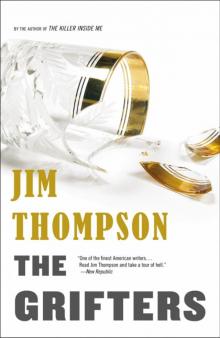 The Grifters
The Grifters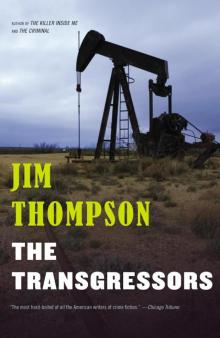 The Transgressors
The Transgressors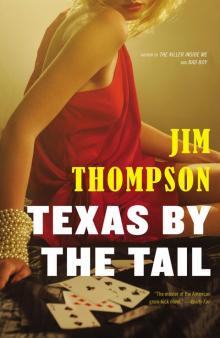 Texas by the Tail
Texas by the Tail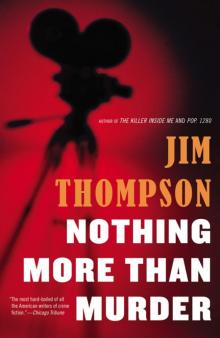 Nothing More Than Murder
Nothing More Than Murder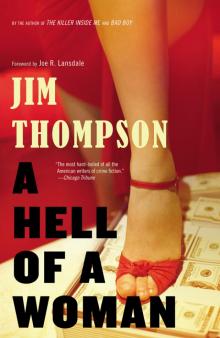 A Hell of a Woman
A Hell of a Woman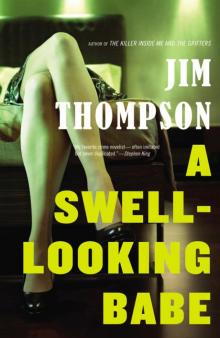 A Swell-Looking Babe
A Swell-Looking Babe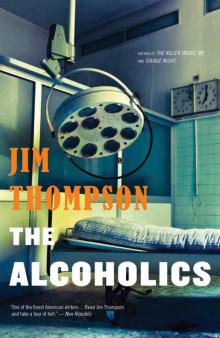 The Alcoholics
The Alcoholics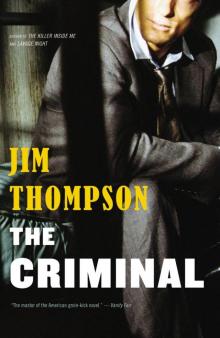 The Criminal
The Criminal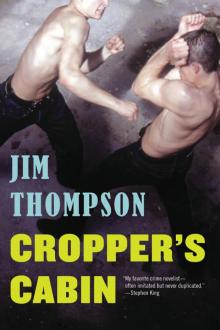 Cropper's Cabin
Cropper's Cabin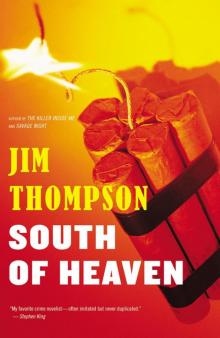 South of Heaven
South of Heaven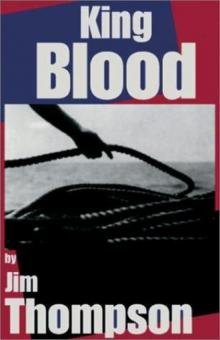 King Blood
King Blood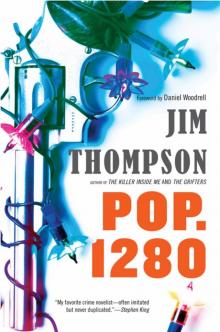 Pop. 1280
Pop. 1280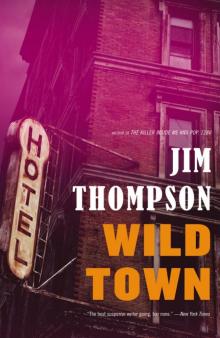 Wild Town
Wild Town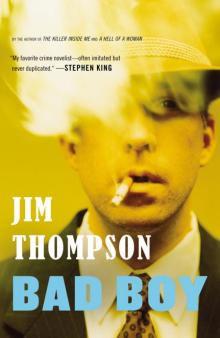 Bad Boy
Bad Boy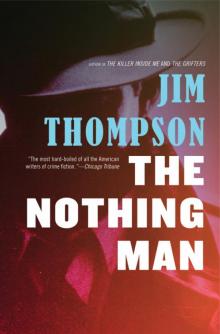 The Nothing Man
The Nothing Man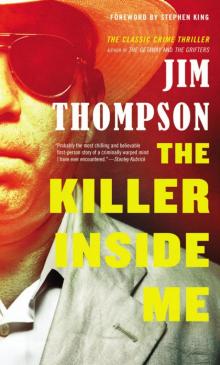 The Killer Inside Me
The Killer Inside Me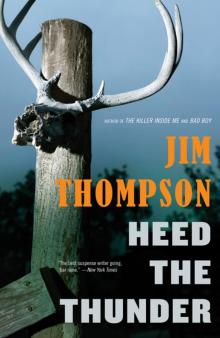 Heed the Thunder
Heed the Thunder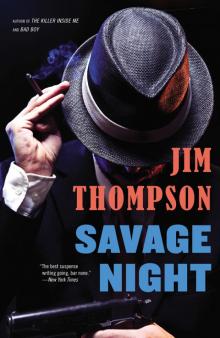 Savage Night
Savage Night Recoil
Recoil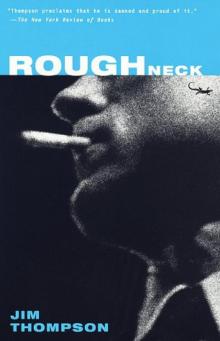 Roughneck
Roughneck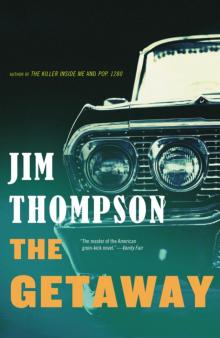 The Getaway
The Getaway